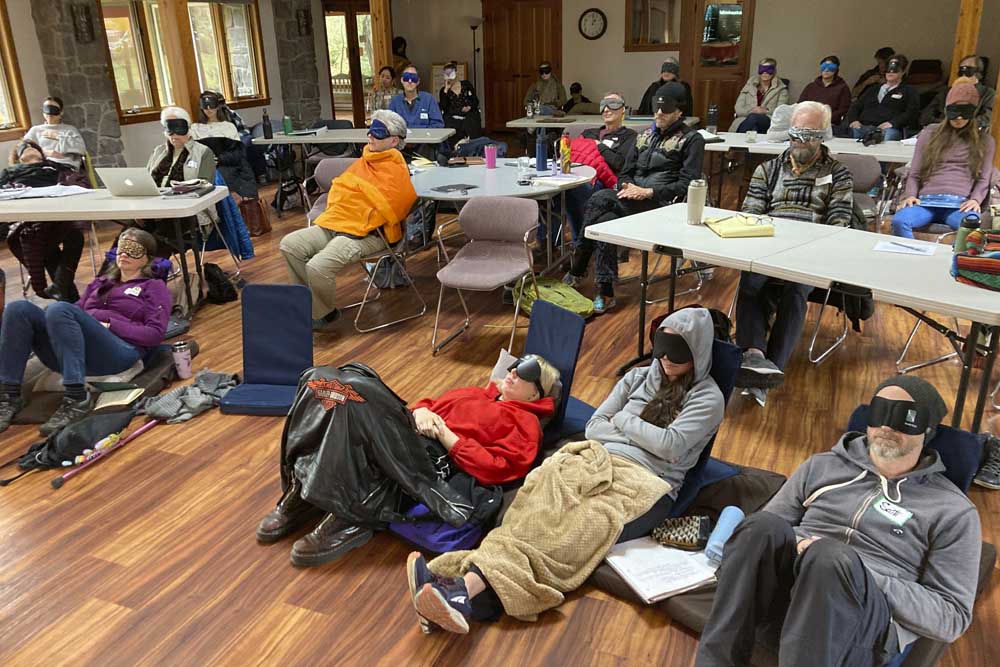Oregon’s psilocybin industry, a year old, seeks customers
Published 4:11 pm Monday, June 10, 2024

- Psilocybin facilitator students sit with eye masks on while listening to music during an experiential activity at a training session near Damascus in 2022. They were being trained in how to accompany patients tripping on psilocybin as Oregon prepares to become the first state in America to offer controlled use of the psychedelic mushroom to the public.
A year in, Oregon’s experiment with the first regulated psilocybin mushroom market in the world is short on customers.
To attract them, advocates say the industry needs to get the word out about its benefits.
Trending
“We think everybody knows that psychedelics can help them because we’re in this little bubble. But 99% of people have no idea what they could get out of a journey,” said Heidi Venture, founder of a Hood River mushroom center, Vital Reset, where customers undergo supervised “trips” on psilocybin, the psychedelic compound in magic mushrooms.
She was among about 100 local psilocybin entrepreneurs who attended a recent industry conference in Portland. Attendees included business owners like Venture who run state-licensed centers where customers can trip on mushrooms, and trained guides, known as facilitators, who accompany them on the hours-long journey.
The conference was hosted by the Psilocybin Assisted Therapy Association, a nonprofit that’s trying to raise awareness of the health and spiritual benefits detailed in studies on the supervised use of psychedelics like psilocybin.
Panelists recalled a year of challenges, red tape and waning interest in guided mushroom trips under Oregon’s pioneering legal model, but also life-changing experiences for clients. They pledged to share information and lobby lawmakers for regulatory improvements.
A majority of Oregon voters in 2020 approved Measure 109, which directed the Oregon Health Authority to create a legal system for offering psilocybin. Unlike marijuana, customers can only buy and use psilocybin mushrooms under the watchful eye of a state-licensed facilitator and in a service center like Vital Reset.
Prices usually range between $800 and $2,500 for a trip and two therapeutic sessions with a facilitator — although advocates say discounts are often available.
Trending
Activists in other states are watching Oregon’s experiment closely, including in Colorado, which is debuting a more relaxed system. Like Oregon, that state will license centers and facilitators but has also decriminalized the use and sharing of psilocybin and other psychedelics.
When Oregon’s first psilocybin center opened in Eugene in June 2023, it was the first in the nation to offer access to the drug in a licensed setting. The drug is still illegal by federal standards, categorized as a Schedule I substance, meaning that it has no accepted medical use and a high potential for abuse.
To date, roughly 3,500 clients have taken a supervised trip in one of Oregon’s 25 psilocybin centers.
The nonprofit Healing Advocacy Fund, which advocates for psilocybin policy and supports entrepreneurs, estimates that number to increase to about 7,000 by the end of the year. That’s lower than some observers expected, who predicted a surge of interest in the nation’s first legal opportunity to use a psychedelic drug.
‘It’s going to get over-saturated’
Oregon has 25 licensed centers, but not all of them have made it.
In March, The Journey service center in Portland became the first to fold for a lack of customers.
“Unfortunately we’ve seen one service center close down. I imagine there will be more, because very quickly it’s going to get over-saturated,” said Tori Armbrust, owner of Satori Farms PDX. Armbrust grows psilocybin mushrooms and sells them to about half of the service centers in the state.
Venture, who owns Vital Reset in Hood River, is trying to attract more customers.
Like many centers, Vital Reset is offering discounts to people from underrepresented communities.
However, she said she’s hamstrung by strict rules on online advertisements for psilocybin services. According to the Healing Advocacy Fund, magic mushroom businesses must prove that their advertisements aren’t reaching too many children or consumers under 21.
‘Stay positive’
Despite the business challenges, Oregon’s psychedelic entrepreneurs are often floored by the positive impact felt by customers who use psilocybin, particularly people with treatment-resistant depression, addiction and trauma.
“If we just hang in there, stay positive, it will evolve into something we can all be proud of,” said Mary Nielsen, owner of Brain Brew PDX in Beaverton.
Jesse Sweet, an Oregon Health Authority policy analyst, said the agency doesn’t have that authority.
The agency is kicking off another round of rules on a law requiring that centers collect certain data on their customers and will seek public input this year. Its new rules could tweak the current regulations, and lawmakers are expected to revisit the issue perhaps next year.








